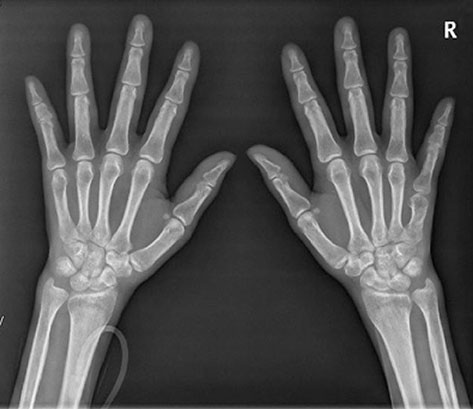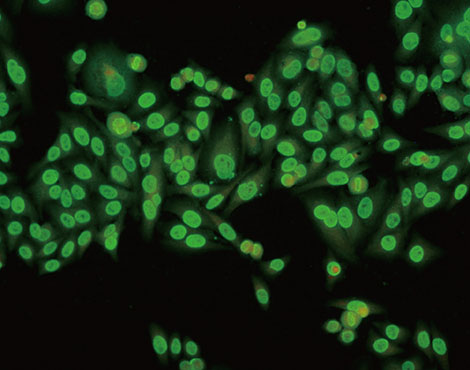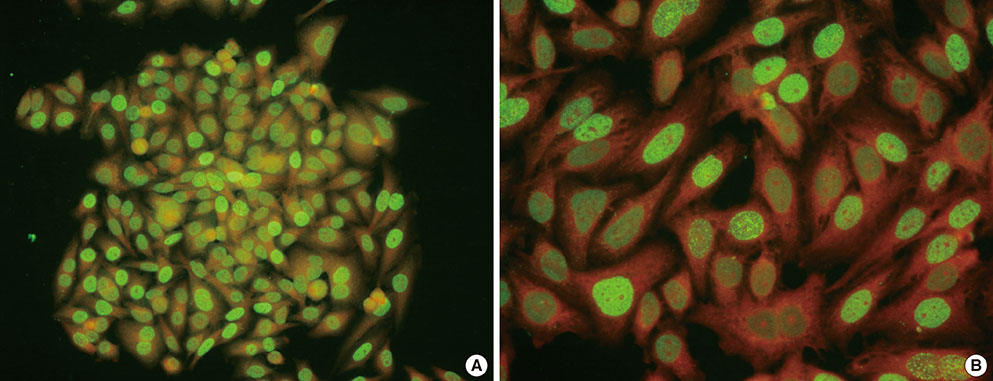Lab Med Online.
2015 Apr;5(2):106-109. 10.3343/lmo.2015.5.2.106.
Anti-Proliferating Cell Nuclear Antigen Antibodies Detected in Rheumatoid Arthritis: A Case Report
- Affiliations
-
- 1Department of Laboratory Medicine, College of Medicine, Hanyang University, Seoul, Korea. tykim@hanyang.ac.kr
- KMID: 2312283
- DOI: http://doi.org/10.3343/lmo.2015.5.2.106
Abstract
- Rheumatoid arthritis (RA) is an autoimmune disease that results in a chronic inflammatory disorder, which principally attacks the small joints. Several autoantibodies, such as rheumatoid factor (RF) and anti-cyclic citrullinated peptide (CCP) antibody, are known to be associated with RA. Anti-proliferating cell nuclear antigen (PCNA) antibodies are mainly observed in patients with systemic lupus erythematosus (SLE). Indeed, a high titer of these antibodies is considered highly suggestive of SLE; however, anti-PCNA antibodies also appear in other autoimmune diseases. Two previous reports described RA patients with low titers of anti-PCNA antibodies, respectively. In this report, we describe a case of an RA patient exhibiting a high titer (>1:2,560) of anti-PCNA antibodies. The 56-yr-old female patient, with no underlying disease or medication history, presented with multiple joint pain and morning stiffness that had begun 6 months prior. The erythrocyte sedimentation rate (ESR) and RF were elevated (102 mm/hr and 77 IU/mL, respectively), and C-reactive protein (CRP) was 0.8 mg/dL. While the test for anti-CCP antibodies was negative, an anti-PCNA pattern (>1:2,560) and a homogeneous pattern (1:320) were detected by autoimmune target (AIT) test. The presence of anti-PCNA antibodies was subsequently confirmed using the double immunodiffusion method. The anti-dsDNA test was also positive (1:160). X-ray imaging showed soft tissue swelling of multiple joints of both hands and wrists. According to the 2010 American College of Rheumatology/European League Against Rheumatism (ACR/EULAR) classification criteria, the patient was classified as having RA. This is the first case to describe high titers anti-PCNA antibodies associated with RA.
MeSH Terms
-
Antibodies*
Arthralgia
Arthritis, Rheumatoid*
Autoantibodies
Autoimmune Diseases
Blood Sedimentation
C-Reactive Protein
Classification
Female
Hand
Humans
Immunodiffusion
Joints
Lupus Erythematosus, Systemic
Proliferating Cell Nuclear Antigen
Rheumatic Diseases
Rheumatoid Factor
Wrist
Antibodies
Autoantibodies
C-Reactive Protein
Proliferating Cell Nuclear Antigen
Rheumatoid Factor
Figure
Reference
-
1. Nielen MM, van Schaardenburg D, Reesink HW, van de Stadt RJ, van der Horst-Bruinsma IE, de Koning MH, et al. Specific autoantibodies precede the symptoms of rheumatoid arthritis: a study of serial measurements in blood donors. Arthritis Rheum. 2004; 50:380–386.
Article2. Lee AN, Beck CE, Hall M. Rheumatoid factor and anti-CCP autoantibodies in rheumatoid arthritis: a review. Clin Lab Sci. 2008; 21:15–18.3. Kim DA, Kim TY. Anti-microtubule organizing center with microtubule by autoimmune target test is also useful serological marker in rheumatoid arthritis evaluation. Rheumatol Int. 2013; 33:805–808.
Article4. Mahler M, Miyachi K, Peebles C, Fritzler MJ. The clinical significance of autoantibodies to the proliferating cell nuclear antigen (PCNA). Autoimmun Rev. 2012; 11:771–775.
Article5. Vermeersch P, De Beeck KO, Lauwerys BR, Van den Bergh K, Develter M, Marien G, et al. Antinuclear antibodies directed against proliferating cell nuclear antigen are not specifically associated with systemic lupus erythematosus. Ann Rheum Dis. 2009; 68:1791–1793.
Article6. Beyne-Rauzy O, Thébault S, Adoue D, Fortenfant F. Anti-PCNA antibodies: prevalence and predictive value. Joint Bone Spine. 2005; 72:432–435.
Article7. Fritzler MJ, McCarty GA, Ryan JP, Kinsella TD. Clinical features of patients with antibodies directed against proliferating cell nuclear antigen. Arthritis Rheum. 1983; 26:140–145.
Article8. Mahler M, Silverman ED, Fritzler MJ. Novel diagnostic and clinical aspects of anti-PCNA antibodies detected by novel detection methods. Lupus. 2010; 19:1527–1533.
Article9. Tzang BS, Chen TY, Hsu TC, Liu YC, Tsay GJ. Presentation of autoantibody to proliferating cell nuclear antigen in patients with chronic hepatitis B and C virus infection. Ann Rheum Dis. 1999; 58:630–634.
Article10. Miyachi K, Fritzler MJ, Tan EM. Autoantibody to a nuclear antigen in proliferating cells. J Immunol. 1978; 121:2228–2234.11. Ogata K, Ogata Y, Nakamura RM, Tan EM. Purification and N-terminal amino acid sequence of proliferating cell nuclear antigen (PCNA)/cyclin and development of ELISA for anti-PCNA antibodies. J Immunol. 1985; 135:2623–2627.12. Celis JE, Madsen P, Nielsen HV, Gesser B, Rasmussen HH, Cruger D. Cyclin/PCNA is a cell cycle modulated nuclear protein with a role in DNA replication. Arch Biol Med Exp (Santiago). 1988; 21:417–421.13. Bravo R, Frank R, Blundell PA, Macdonald-Bravo H. Cyclin/PCNA is the auxiliary protein of DNA polymerase-delta. Nature. 1987; 326:515–517.
Article14. Moldovan GL, Pfander B, Jentsch S. PCNA, the maestro of the replication fork. Cell. 2007; 129:665–679.
Article15. Maga G. Proliferating cell nuclear antigen (PCNA): a dancer with many partners. J Cell Sci. 2003; 116:3051–3060.
Article16. Lee ZY, Kim TY. A case of small cell lung carcinoma with coexisting autoantibodies against proliferating cell nuclear antigen and centriole detected using the autoimmune target test. Lab Med Online. 2014; 4:218–221.
Article17. Simón JA, Granados J, Cabiedes J, Morales JR, Varela JA. Clinical and immunogenetic characterization of Mexican patients with 'rhupus'. Lupus. 2002; 11:287–292.
Article18. Paulus HE, Wiesner J, Bulpitt KJ, Patnaik M, Law J, Park GS, et al. Autoantibodies in early seropositive rheumatoid arthritis, before and during disease modifying antirheumatic drug treatment. J Rheumatol. 2002; 29:2513–2520.19. Garcia-de la Torre I, Miranda-Mendez L. Studies of antinuclear antibodies in rheumatoid arthritis. J Rheumatol. 1982; 9:603–606.20. Nishimura S, Nishiya K, Hisakawa N, Chikazawa H, Ookubo S, Nakatani K, et al. Positivity for antinuclear antibody in patients with advanced rheumatoid arthritis. Acta Med Okayama. 1996; 50:261–265.
- Full Text Links
- Actions
-
Cited
- CITED
-
- Close
- Share
- Similar articles
-
- Enhanced Expression of Proliferating Cell Nuclear Antigen in Psoriatic Epidermis
- IMMUNOHISTOCHEMICAL STUDY OF Ki-67 AND PROLIFERATING CELL NUCLEAR ANTIGEN EXPRESSION IN MALIGNANT MELANOMA
- The Changes of Telomerase Activity and Proliferating Cell Nuclear Antigen (PCNA) Expression in the Developmental Stages of Rat Kidney
- Proliferating cell nuclear antigen in squamous cell carcinoma of the uterine cervix
- The clinical significance of anti-CCP antibodies in rheumatoid arthritis




